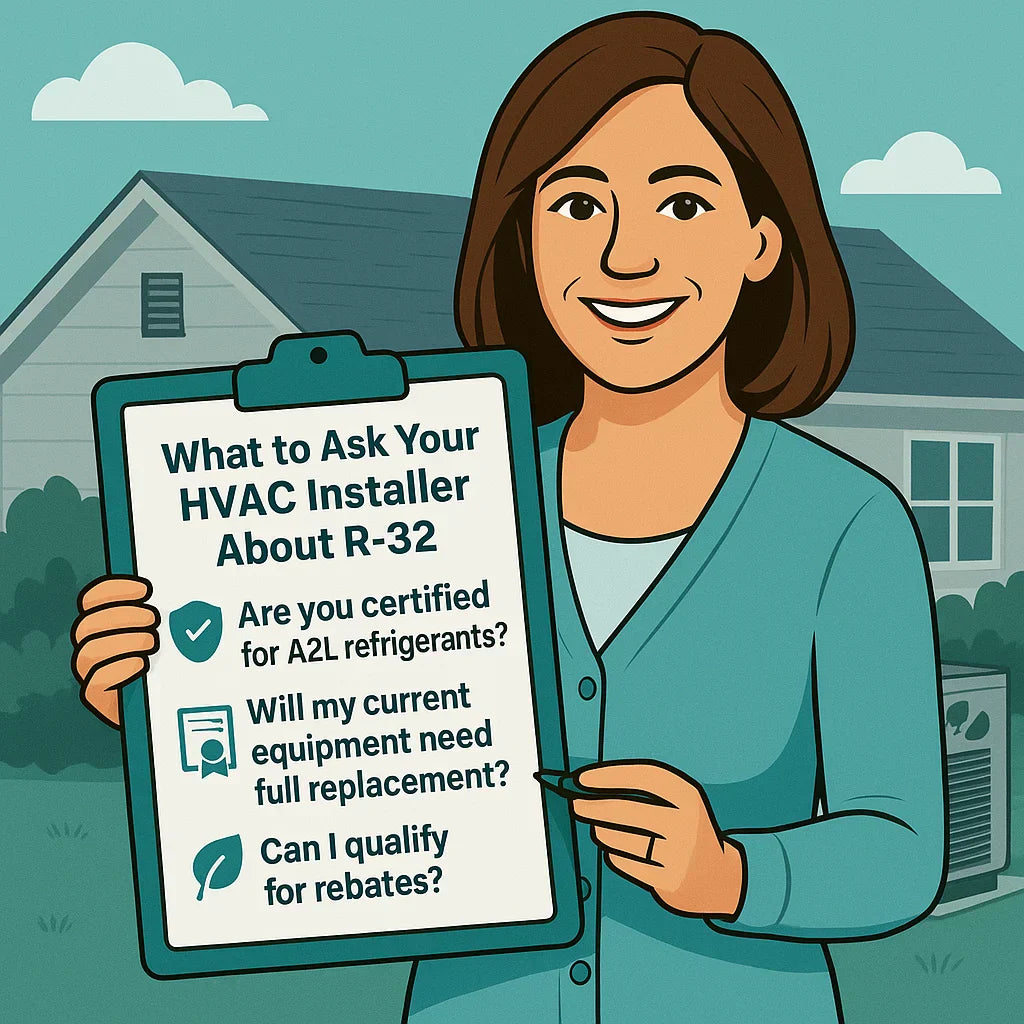With the growing phase-down of high-GWP refrigerants like R-410A, many homeowners are considering whether they can retrofit existing HVAC systems with newer, greener refrigerants like R-32. The short answer? R-32 is not a drop-in replacement for R-410A, and there are important technical, safety, and legal reasons why.
In this guide, we’ll walk you through what makes R-32 different, why you can’t simply swap refrigerants, and how to plan for a smart transition when it’s time to replace your HVAC system.
🧪 R-32 vs. R-410A: What’s the Difference?
| Property | R-32 | R-410A |
|---|---|---|
| Composition | Single-component (CH2F2) | Blend (R-32 + R-125) |
| GWP | 675 | 2,088 |
| Flammability | Mildly flammable (A2L) | Non-flammable (A1) |
| Pressure Level | Slightly higher | High |
| Efficiency | Higher | Standard |
👉 EPA SNAP Program: Approved Refrigerants
🛑 Why You Can’t Retrofit R-410A Systems with R-32
R-32 requires different system components. Swapping refrigerants can cause system damage, void warranties, and violate codes. Here’s why:
-
Compressor Compatibility – R-32 systems use compressors specifically engineered for its thermodynamic properties.
-
Oil Incompatibility – The lubricant used in R-410A systems may not mix well with R-32, risking wear or failure.
-
Flammability Standards – R-32’s A2L classification requires sealed electrical components and ventilation safeguards.
-
Line Set and Expansion Valve Differences – Even tubing dimensions and metering devices must match R-32 specs.
-
Legal Restrictions – Local building codes and EPA regulations prohibit retrofitting with flammable refrigerants in incompatible systems.
🔄 So, What Are Your Options?
If your R-410A system is aging, consider replacing it with an R-32-ready system that offers:
-
Better efficiency
-
Lower environmental impact
-
Future-proof compliance with refrigerant phase-outs
R-32 equipment is becoming more affordable and accessible through ENERGY STAR-rated options.
👉 ENERGY STAR Central AC and Heat Pump Directory
📋 Questions to Ask Your HVAC Installer
Before making the switch, ask your contractor:
-
Are you certified to work with A2L refrigerants like R-32?
-
Will this install meet local and national safety codes?
-
Will I need new refrigerant lines, coils, or air handler?
-
What’s the total cost of upgrading vs. retrofitting?
-
Can I qualify for rebates or tax credits with a new R-32 system?
👉 Find Certified Contractors – ACCA
🏗️ What to Expect from a Full R-32 System Replacement
A full upgrade typically includes:
-
New R-32-compatible outdoor condenser
-
Indoor coil and air handler replacement
-
Smart thermostat installation (optional)
-
New line set or flush of existing one (if compatible)
-
Pressure and leak tests by a licensed technician
Installers should follow all safety protocols for A2L refrigerants, including ventilation and ignition protection.
👉 AHRI Certified Products Directory
💲 Cost Comparison: Retrofit vs. Full Replacement
| Option | Average Cost | Long-Term Viability |
| Retrofit (not allowed with R-32) | Not applicable | Unsafe / non-compliant |
| Full R-32 System Install | $5,000–$9,500 | Highly efficient and compliant |
Retrofitting is not a safe or code-compliant option for R-32.
✅ Best Practices for Transitioning to R-32
-
Plan HVAC replacements 1–2 seasons in advance
-
Compare quotes from contractors certified in R-32 installs
-
Choose systems with ENERGY STAR and SEER2/HSPF2 compliance
-
Ask about dual fuel options for colder climates
-
Register your new unit for warranties and rebates
🏡 Final Thoughts: Time to Plan, Not Panic
You don’t need to rip out a perfectly functioning R-410A system. But when replacement time comes, don’t count on retrofitting with R-32.
Instead, explore R-32 systems that are designed for higher performance and future refrigerant compliance. With professional installation and proper planning, you’ll gain greater comfort, savings, and peace of mind.
👉 Browse R-32 AC and Gas Furnace Systems at The Furnace Outlet
In the next topic we will kow more about: Will a 2.5 Ton R-32 System Keep Up in Hot or Cold Climates?







